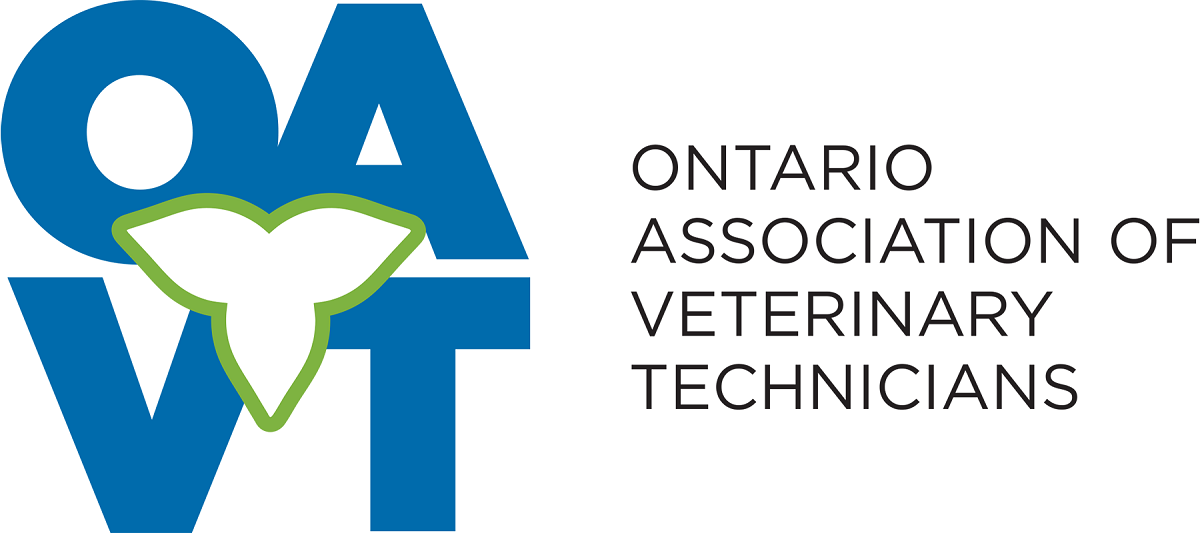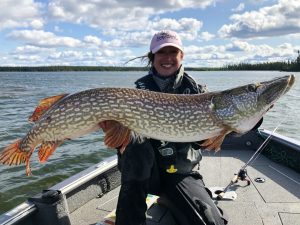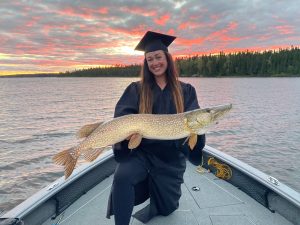Alyssa Goodenough, RVT, BSc
Where did you go to school and what made you decide to take a Veterinary Technology program?
I completed my veterinary technician schooling at Georgian College in Orillia, graduating in 2019. I then returned to the University of Waterloo (U of W) and graduated with my BSc in biology and chemistry in 2022.
As a child, I always dreamed of being a veterinarian, and attended U of W hoping to one day attend vet school. After a severe head injury, I was forced to leave university, which ended up being a blessing in disguise. My love of learning meant I did not want to leave post-secondary education, so I decided to pursue vet tech diploma as I recovered, so I was still able to learn and work in the field I loved.
I really enjoyed vet tech school and everything I learned, but I also enjoyed the Barrie-Orillia-Muskoka area where I was able to spend my spare time working at Cabela’s and fishing.
Where are you employed currently and how long have you been there?
After graduation, I worked in regular vet practice on and off between school and my job as a professional fishing guide in Northern Manitoba. I started at the trophy, 5-star, North Haven Resort in Northern Manitoba in 2019. The border closures during COVID shut us down for two years, at which point I became involved with the Rabies Response Program and also focused on finishing my undergrad at U of W. In 2022, I finally returned to guiding and couldn’t have been happier. I know this is an unconventional path for an RVT and it may not seem to be connected to veterinary medicine in the slightest, but I promise I take the knowledge I’ve learned as an RVT and apply it every day.
Being an RVT has made me a better, more ethical fishing guide. The respect I have for fish is unmatched, and I strive to use and promote the most ethical form of catch-and-release possible. Veterinary medicine sparked my love of anatomy and physiology (and everything science) and this love flooded over into my fishing career.
While finishing my undergrad, I explored animal physiology and ecology even more. It was here I discovered the world of research and finally, all my worlds collided! Now, in addition to guiding in the summers, I am completing my Masters of Biology under the supervision of Dr. Steven Cooke in the Fish Ecology and Conservation Physiology Lab at Carleton University, and Dr. Andy Danylchuk of the University of Massachusetts Amherst. In the spirit of learning, I don’t plan to stop any time soon and will pursue my PhD and post-doctoral studies in the future.
What’s a typical day like for you?
As an RVT in graduate school, I typically spend my day researching for my own projects. One of my projects is to create a more welcoming and inclusive environment for women in recreational fishing, and the second is focused on angler gear choices and subsequent reflex impairment. In addition, I have the opportunity to collaborate with other members in the research lab, helping them with their projects. Again, being an RVT is the perfect complement to grad school! Our lab does a ton of fabulous work that often involves surgical procedures performed in the field. Animal care, husbandry, and handling (of relatively unique species) are at the core of every research project, and we often work alongside ethics boards including the Canadian Council on Animal Care (one I am sure we, as RVTs, are all very familiar with). I also serve as the Science Communication and Education Coordinator for the Student Subunit of the American Fisheries Society, Ontario Chapter. Here, I help to create Fish Fact Fridays, which highlights student research on our social pages. Lastly, I am the founder of Northern Predator, a small fishing business, which I hope can assist in bridging the gap between scientific communities. In addition to creating anatomy-specific fishing apparel and running weekly Trivia Tuesdays and Fish Fact Fridays, I will be hosting a bi-weekly, scientific fishing podcast that will discuss ways in which we can use science and scientific literature to become better, more ethical fisherman.
This summer, I will be taking my research on the water at North Haven Resort, collecting my field data as I guide. For three months, I’ll be on the water for 10+ hours a day, completing a reflex impairment assessment known as RAMP, on every fish we catch. This, paired with data on fight intensity, will hopefully allow conclusions to be made about the impact of rod selection on the probability of mortality, which will eventually result in my findings being published in a scientific journal and presented at scientific conferences.
What do you think are the best skills or traits that you bring to your role as an RVT?
Compassion, empathy, and the love of learning. I respect and care so deeply about animals of all kinds and hope that my passion can inspire the same in others. In fact, I choose to dedicate my life as an RVT, professional fishing guide, and fishy scientist, to not only promoting the well-being of animals (specifically fish), but to providing scientific evidence on the importance of doing so, while also educating the public.
What are you most passionate about in your career?
Animal welfare. As many RVTs know, regular practice can be difficult and at times heartbreaking. As a sensitive sole, it was very difficult for me to see animals that had been mistreated. This is one of the reasons I chose to pursue research instead of veterinary school. I decided I wanted to provide evidence on the importance of animal care, no matter the species and their “presumed” nociceptive abilities. Instead of treating mistreatment, I want to educate in hopes of stopping the abuse before it begins. I found a group of species (fish) that were in desperate need of assistance, in an industry I believed I could have a powerful impact on.
What are you most proud of in your career?
Honestly, my journey. Despite a plethora of roadblocks and changes of direction, I somehow found my way and found myself as well. I am by no means where I thought I would have been at this point, but that broken road led me to my unconventional life as an RVT, female professional fishing guide, and Masters’ student.
Who was your greatest mentor (teacher, manager, colleague, etc.) who helped get you to where you are today in your career?
My families – my biological family and my North Haven Resort (NHR) family. I’m not good at keeping in touch with people whom I’ve crossed paths with, but my family and NHR have remained a constant, unwavering support system for me. Being a female in the world of guiding comes with its fair share of challenges, and when I start to lose faith in myself, my team and managers have pushed me on. My transition into grad school, immediately following a summer of working up north, was a rocky one. My family provided the support I needed for this big change, which left me feeling completely exhausted and missing the north more than ever. Since day one, my families have kept me on track when I so desperately wanted to quit, and for that, I am forever thankful.
Who has inspired you in your career as an RVT, and how?
Everyone! Especially those I met in regular and emergency practice. Being an RVT is difficult, to say the least, and I respect every one of them and commend them for their tireless efforts. It is a hard job, both physically and mentally. For me, the emotional drain of working in a practice was too much. You have to be a strong person to go that route. But, for those who choose not to pursue regular practice, there are plenty of options and opportunities inside and outside of veterinary medicine, where being an RVT is an incredible asset!
What specific advice would you share with someone as they enter the RVT profession?
Make it your own adventure. Find a way to make it what you love! Specialize, find your niche and explore your options. Whether it is just to ask your clinic for more shifts in a specific area, specializing through OAVT, or forging your own path as I did. Find what you love and do it for as long as you can, and NEVER STOP LEARNING.
If there’s one thing you could have done differently on your path to becoming an RVT, what would it have been?
Don’t rush. Don’t rush school or learning, don’t rush in practice, and don’t rush your journey. Instead, try and get the most out of every experience and opportunity.


